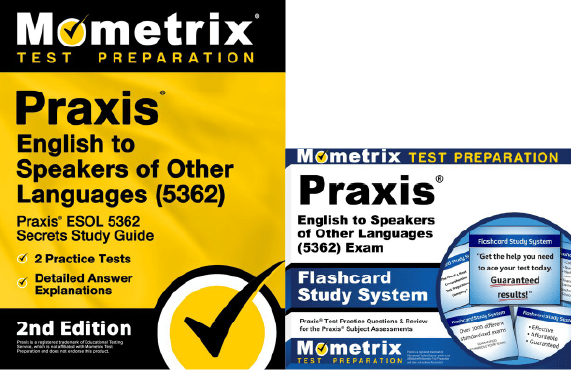If you need help studying for the Praxis® English to Speakers of Other Languages (ESOL) test or just want some more information about what the test is like, you’ve come to the right place!
Click below to take a free Praxis ESOL practice test!
What’s on the Exam?
First, let’s talk about the questions on the Praxis ESOL test. There are 120 selected-response questions in total.
Selected-response questions can appear in several different forms:
- Single-selection multiple-choice
- Selecting ALL correct answers from a list of choices
- Selecting the correct answer from a drop-down menu
- Clicking parts of a graphic such as a map or a chart
- Dragging and dropping answers into a targeted area on the screen
The time limit for the test is 2 hours. There aren’t any scheduled breaks, but you’re free to take restroom breaks as needed!
Let’s take a closer look at the different sections of the ESOL test:
1. Foundations of Linguistics
22 questions
- Phonetics
- Stress and intonation patterns
- International phonetic alphabet (IPA)
- Morphemes
- English syntax
- Parts of speech
- Semantics
- The differences and similarities between languages
- Pragmatics
- Sociolinguistic concepts
- World Englishes
- Written English conventions
- Rhetorical patterns
- Communicative competence
- English language inconsistencies and irregularities
2. Foundations of Langauge Learning
26 questions
- Social vs. academic language functions
- Similarities and differences between first-language and second-language acquisition
- Processes of second-language acquisition
- Affective factors of second-language learning
- The relationship between English graphemes and phonemes
- Literacy development of ELs
- Various factors impacting student performance
3. Planning and Implementing Instruction
28 questions
- The implication of dialect variation for instruction
- Methods of teaching ELs
- Designing appropriate objectives and classroom activities
- Collaborating with other educators in designing classroom activities
- Integrating speaking, writing, reading, and listening
- Promoting ELs’ acquisition of productive and receptive skills
- Teaching language skills contextually
- Promoting autonomous learning
- Activating students’ prior knowledge
- Providing meaningful opportunities to learn language
- Using technology to support language development and learning
- Creating a culturally respectful and supportive learning environment
- Using constructive feedback to facilitate English-language learning
- Differentiating instruction based on student needs
- Recognizing SIFEs
- The importance of language modeling
4. Assessment and Evaluation
18 questions
- The role of assessment in the placement and exit from language-support programs
- Formal and informal assessments
- Formative and summative classroom assessments
- Adapting classroom assessments for ELs
- Knowledge of assessment-related issues
- Norm-referenced vs. criterion-references assessments
- Interpreting and communicating assessment data
5. Culture
13 questions
- The interrelationship between culture and language
- The effect of cultural variables on second-language acquisition and teaching
- The variety in student identities within cultures
- Implications of stereotyping, bias, and bullying
- The impact of the teacher’s personal and cultural experiences on teaching style
- Acculturation vs. assimilation
6. Professionalism and Advocacy
13 questions
- Possible differences between disabilities and typical language proficiency development
- Incorporating the diverse cultures of students into instruction
- Legal provisions and ethical implications of laws related to EL education
- Communication with school personnel about the needs and characteristics of ELs
- Planning and collaborating with ELs and their families
- Benefits of ELs and their families having a variety of outside resources
- Engaging in professional development
How to Register
To register for the test, you’ll need to create an account on the ETS website. Once your account has been created, you can submit your application to take the test.
The good news is that you might be able to get a fee waiver, if you meet ALL of these requirements:
- You are receiving financial aid
- You are an enrolled undergraduate or graduate student
- You can provide a current FAFSA Student Aid Report that shows an Expected Family Contribution (EFC) of $3,000 or less
- You are required to take the test by an authorized score recipient
Praxis Scores
The Praxis ESOL test is scored using a scaled scoring method. Here’s how it works:
For every question you answer correctly, you get one point added to your raw score. At the end of the test, your final raw score will be converted to a scaled score. This scaled score will range somewhere between 100 and 200.
The reason your raw score is converted to a scaled score is because everyone that takes the test is given a slightly different set of questions. Since everyone has a different arrangement of questions, and because some questions are harder than others, converting your raw score to a scaled score ensures a more even playing field.
Receiving Your Score
When you receive your skill report, it will tell you how many questions you missed in each section and generally whether you passed or not.
Your scores will become available on your Praxis account on the score reporting date. When you get the score back depends on the testing date.
FAQs
How many questions are on the Praxis ESOL test?
The test contains 120 questions.
What is the time limit for the Praxis ESOL test?
The test is timed at 2 hours.
What is the passing score for the Praxis ESOL test?
Most states require a final score of 155 to pass.
How much does the Praxis ESOL test cost?
The testing fee is $130.
Praxis is a registered trademark of Educational Testing Service, which is not affiliated with Mometrix Test Preparation and does not endorse this page.



 Praxis Study Guide
Praxis Study Guide Praxis Flashcards
Praxis Flashcards